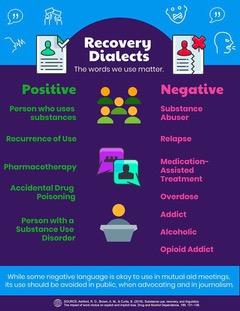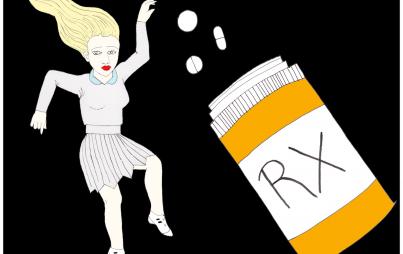
The recovery community is advocating for increased access to treatment and reducing stigma, yet the language we’re using is undermining those efforts.
The latest research on addiction recovery suggests that we don’t have the luxury of personal choice in our use of language when we are talking about the highly stigmatized condition of addiction.
Recovery scientists have found that the language we use not only affects access to quality treatment — which is already grossly lacking — but also negatively affects both the public’s and the medical profession’s perceptions of this deadly medical condition. This stigma also presents a significant barrier to engaging in treatment.
Addiction is the public health crisis of our time, and its effects are devastating. In the United States, 115 people die each day of opioid-related causes, and 88,000 people per year suffer alcohol-related deaths. Despite the 21 million people with diagnosable substance use disorder, fewer than 3.8 million receive treatment each year. Of those who believe they have a need for treatment but don't ever receive it, over a quarter say that reasons concerning stigma hold them back from seeking it. Specifically, they are concerned about the negative perception neighbors and co-workers have of people who suffer from addiction.
It seems at odds to me that the recovery community is advocating for increased access to treatment and reducing stigma, and yet the language we’re using is potentially undermining those efforts.
If you’re one of the fortunate ten percent of people who have received treatment, and you entered a 12-step program, you’ll likely have been told about the importance of gratitude. One of the ways we show that gratitude is through helping others in mutual-aid meetings, writing about addiction, and advocating for reduced stigma and increased access to treatment.
It is common to use phrases such as “alcoholic” or “addict” to refer both to ourselves and to our peers in recovery, and to refer to people who actively take drugs. Some of us find it empowering to reclaim that language by owning who we are and what our relationship to addiction is. And by speaking out about being a person in recovery, we are humanizing the disorder — which in turn actively reduces stigma.
But are we taking the time to consider the broader implications of using this language outside of our peer group? Is our personal choice of language to describe our sober identity undermining those efforts by — perhaps inadvertently—contributing toward stigma rather than working to fight it?
Recent studies suggest that we should stop using the terms “addict” and “alcoholic” because they contribute toward a negative perception of people with substance use disorder. Arielle Ashford, who is in long-term recovery and has a masters degree in social work, says: “When it comes to language, it is important to remember the context in which the word is used. If in a Narcotics Anonymous meeting, someone refers to themselves as an ‘addict’ that’s okay because that language is acceptable in that context. In the media, news, film, op-eds, etc. when we use that word, we will automatically envision a feeling or an image, attached to that word from our own experience and the message the person is trying to convey will be lost. As a person in recovery,” Ashford continues, “I expect if you’re going to use the word ‘addict’ it should only be in meetings — never ever in public. And it is not okay for a person who is not in recovery to label someone an addict.”
Negative perceptions of people in recovery can have wide-ranging implications. Studies have shown that those who hold stigmatizing perceptions of people with substance use and mental health disorders were unwilling to have a person with drug addiction marry into their family or work closely with them. They were also more accepting of discriminatory practices and more likely to oppose policies aimed at helping people with addictions.
Is it any wonder that stigma is a major barrier to accessing treatment?
I spoke to Dr. Brenda Curtis, Assistant Professor of Psychology in Psychiatry, from the Center for Studies of Addiction at the University of Pennsylvania Perelman School of Medicine. She is a co-author of the recent study on language, “Substance use, recovery, and linguistics: The impact of word choice on explicit and implicit bias.” Asked what impact the use of language by medical professionals has on access to care and the stigma those might feel in approaching their doctor, Dr. Curtis explains:
You Might Also Like: When Your Addiction And Depression Are In A Codependent Relationship
“Many people with a SUD (substance use disorder) wait years to decades before they seek professional help if they seek it at all. Individuals may think they do not need help or they may believe treatment might not work for them. When we close our eyes and imagine a person who is experiencing a SUD many have negative images. We see the person as dirty, weak, and someone not to be trusted. We use words like ‘dirty’ and ask questions like ‘Are they clean now?’”
She continues, “It’s common to hold negative views and beliefs about being an ‘addict’ and having a ‘drug problem.’ So, when a health professional asks a patient if they have a ‘drug problem’ or if ‘addiction runs in their family,’ strong negative feelings are immediately elicited, both by the health professional and the individual. And the individual knows this — they know if they respond yes, they will be seen in a negative light. So when they are struggling, especially early, they are less likely to discuss what they are going through, hoping they can fix it themselves. We all fear being shunned, being stigmatized.”

Dr. Curtis’ study found that when people used terms such as “substance abuser,” “addict,” “alcoholic,” and “opioid addict” they were likely to have negative perceptions of people with substance use disorder. I asked Dr. Curtis if referring to someone using such terms may contribute to stigma.
“Stigma involves two primary components — a label and a stereotype,” she responded. “The label (e.g., addict) links the person to a set of undesirable characteristics that work to form the stereotype — for example, the beliefs that addicts brought this on themselves, that they could stop if they wanted to, and that they have a moral deficiency. When people link a certain label to a person and believe the stereotype, they react negatively to the person, which in turn leads them to place more social distance from the person, engage in discriminatory ways, or support potentially harmful activities to the stereotyped individual. People are more likely to support jail time for people with a SUD than to support using public dollars for drug treatment,” explains Dr. Curtis.
Some people in recovery find it empowering to refer to themselves by the very terms that this research has found to be strongly associated with negative perceptions, saying they are reclaiming those terms.
Dr. Curtis explains the impact of reclamation with a powerful comparison: “I’m an African American woman with natural hair who feels empowered by using the words that were once derogatory to refer to my gender, race, and natural hair. I truly understand how we, members of a stigmatized group, can take back language that has historically been used in a negative way and claim it. This is called reappropriation or reclamation. By doing so, we remove the negative associations and replace it with our own definition. Unfortunately, with addiction, I don’t believe we’re there yet, and my research demonstrates we aren’t there yet with the words we examined in our studies. However, as society becomes more informed, some of these words might transition and be ‘reclaimed.’”
It seems at odds to me that the recovery community is advocating for increased access to treatment and reducing stigma, and yet the language we’re using is potentially undermining those efforts. As the research suggests, our advocacy could be better improved by modifying our language outside of the refuge of mutual-aid groups.








